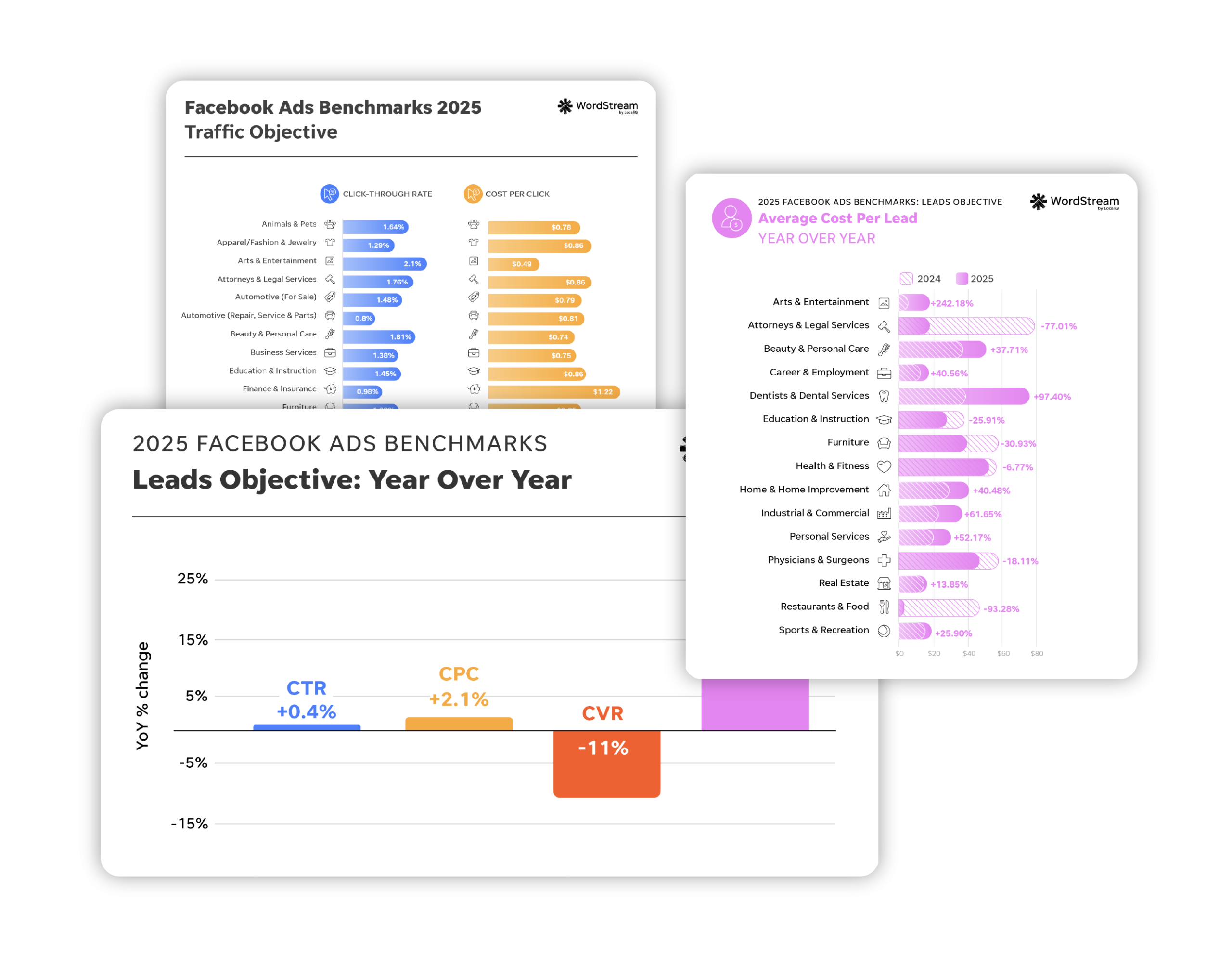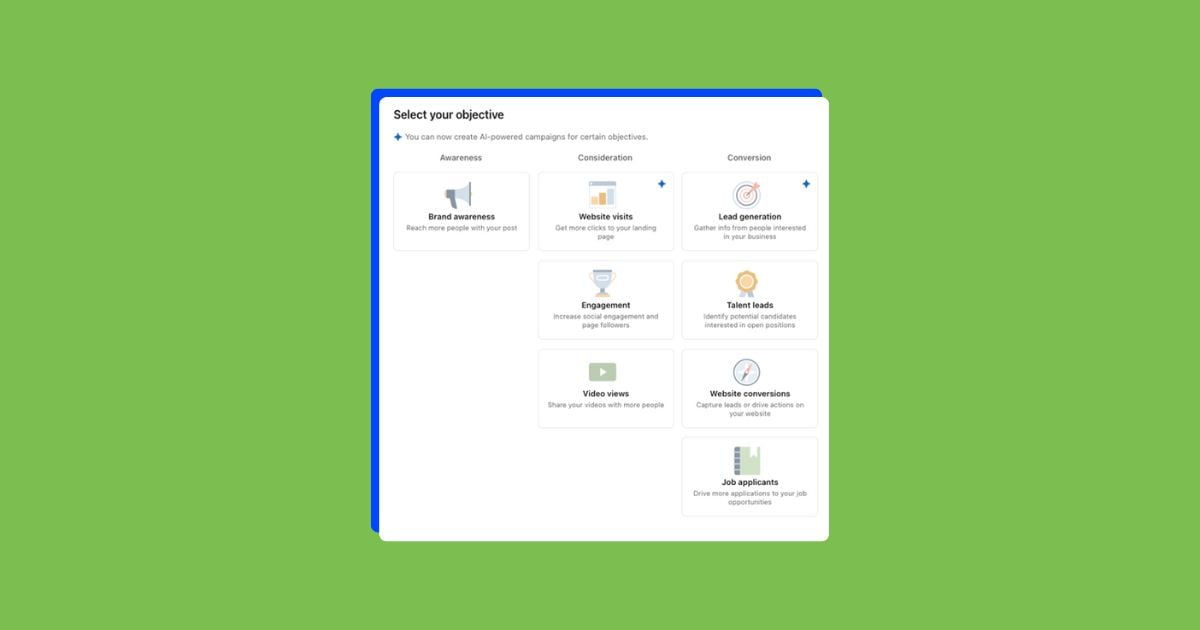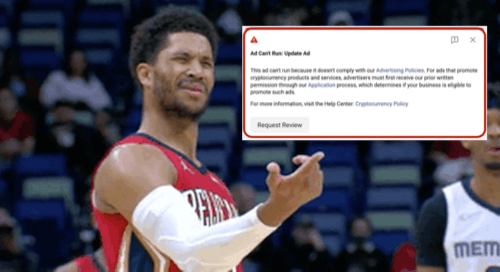
Facebook’s advertising policies, with all its nuances, can be pretty overwhelming. But in this guide, we’re going to help you understand the Facebook ad approval process, how long it takes, and then share with you:
- What to do if your Facebook ad is not approved.
- How to prevent, fix, or appeal a Facebook ad disapproval.
- Common reasons for disapprovals.
- What to do if your account is disabled.
Read on to learn how to get your Facebook ads approved as quickly as possible.
How long does it take for Facebook to approve an ad?
This all depends on the content of your ad, your business category, and more. For some ads, it could take 2-3 hours. For others, a day, and for others, especially in restricted categories, up to 2-3 days.
This is because the Facebook ad review process is a mix of man (or woman!) and machine. Once you hit publish on your ad, it enters into an algorithmic review where a computer will look for the basics like image/text ratio, banned or prohibited content, improper grammar, broken links, and more.
During this stage, some ads get approved and published; some get sent back to the advertiser to edit; but many (60-70%) move on to a manual review process.
In the manual review process, a person looks at the ad and assesses the content in terms of things like context, implications, and quality. From there, your ad can then either get published or rejected.
So this is why one ad can get approved in minutes while others take days.
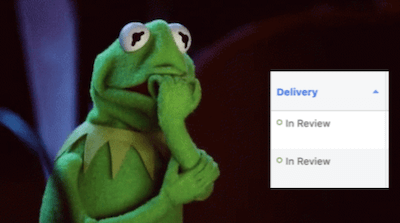
Was your Facebook ad not approved? Here’s what to do
If your Facebook ad gets disapproved, you’ll get a notification referencing which policy you violated, with a link to that policy, and then oftentimes a [very unhelpful] recommendation on how to fix it. (Like “Don’t violate this policy.”) Other times, it will be very vague.
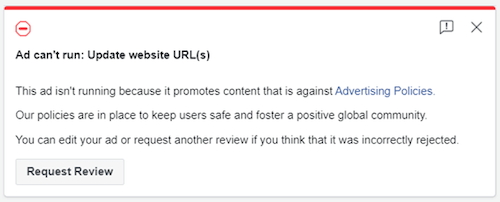
Fortunately, most ads are disapproved for small details that you can easily edit and resubmit for a quick review and approval.
Be sure to read the policy carefully and then review your ad thoroughly. Then make your tweaks to the copy, targeting, images, etc. You’ll now have to wait for approval, which could take another day.
How to appeal Facebook ad disapprovals
If you are sure that the ad is absolutely following the policy and that edits won’t improve the likelihood of approval, you can appeal the disapproval and request another review.
To do this, select the ad that has been disapproved (unfortunately you can only select one at a time) and click the edit button.
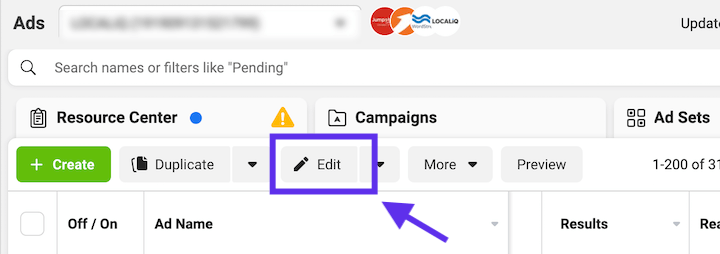
At the top right-hand side of the screen, just above the ad preview, you should see the option to click “Request Review”. A popup will appear where you will confirm your request for a second review (by a human).
In the “Describe your problem” section, keep it concise. No need for an essay! Reference the exact rule you got dinged for and then make your argument. For example, “This ad does not violate the policy of _____. It actually ____ and contains ___ to show ____. Please review, thank you.”
Keep in mind that you can only appeal an ad once for the same disapproval, so do a thorough check to make sure it truly does not violate the policy in any way.
Side note: Was your Facebook ad approved but still not delivering? Check out these 4 Reasons Your Facebook Ads Are Not Delivering (& What to Do About It).
How to prevent or fix a Facebook ad disapproval
You’ve followed all our Facebook advertising tips and even put some of our post iOS strategies in place. You want your ad up and running stat! Use these general rules of thumb to save time and increase the likelihood of your ad being approved as quickly as possible.
1. Keep an eye out for disapprovals
The tricky thing with Facebook ad disapprovals is that between email addresses connected to the account and delays in the notification center, they can sometimes be easy to miss. So make it a habit of checking for disapprovals “manually” using Ads Manager or Facebook Business Suite.
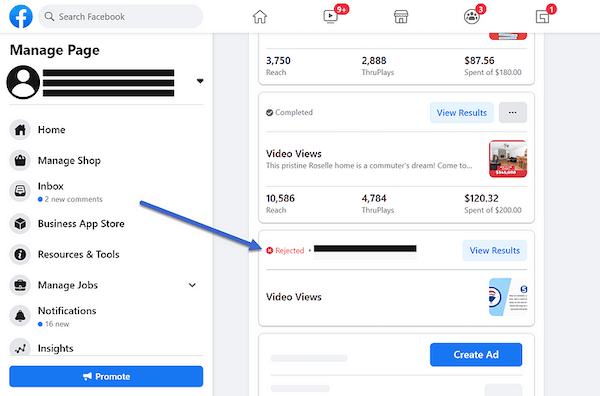
2. Read the policy carefully
If your Facebook ad is rejected, make sure to read the broken policy in full before resubmitting for approval—there are nuances to consider and there are humans reviewing your ad!
3. Play it safe
Yes, being bold and different is one way to write copy that sells. But if you want to get your ad up fast, don’t take risks. If it has something that you sort of think might possibly be potentially offensive, not inclusive, or even erroneously disapproved, don’t try it.
4. Check your ad copy quality…
Sometimes, the more time you spend on a piece of content, the harder it is to identify mistakes. So if you double-check your ad and don’t see anything wrong with it, you should still have someone else review it just in case. Even better, run it through Grammarly for a contextual review.
5. …and quantity
Even though Facebook’s 20% text limit (and the tool to check for it) has been removed, it’s still a best practice to keep your text to a minimum. Facebook talks about it here. Social media feeds are largely visual, so you should let your imagery be the loudest. Check our 9 Tips to Write the Best Facebook Ads Ever for more help with your copy.
6. …and tone
Facebook’s ad disapprovals can be quite nuanced—remember, a large portion of Facebook ads get reviewed by humans. So keep the “fine lines” in mind when you’re going for clever, bold, or compelling ads. Avoid being super detailed about personal attributes that could feel like an invasion of privacy to a user, or sarcasm that could accidentally be misunderstood.
7. Target appropriately
If you’re in a restricted category (and even if you’re not), make sure you’re not targeting underage groups or other demographics or psychographics for whom your offering would be inappropriate.
8. Check your landing pages
If needed for your category, make sure your landing page includes your terms of service, a link to your privacy policy, and any other required information. Also, follow general landing page best practices like continuity between ad and landing page, and keeping the copy clear, honest, and free of anything potentially misleading. And of course make sure the page link is not broken!
9. Check mobile
Landing page experience is a factor in the Facebook ad approval process, and it’s not uncommon to see accidental popups, glitches, or unexpected movements and shifts on mobile. So make sure to test your landing pages on mobile.
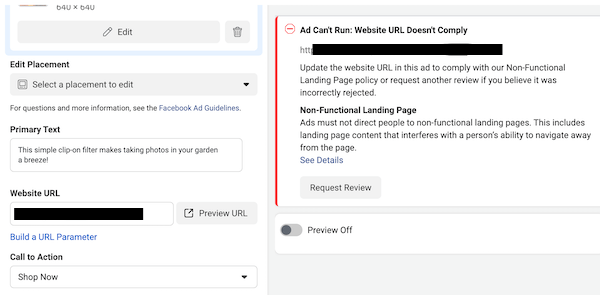
10. Boost posts
For those in the restricted category, you could try boosted posts. If the post is informative rather than commercial, it could get approved.
Why was your Facebook ad not approved? Common reasons
No matter your industry or what you are promoting, your campaigns and ads AND landing pages must follow the below guidelines. But please note that this is a very abridged list, intended for general understanding only. Please refer to Facebook’s official ad policy page for exact details.
Standard policy violations
This is just the term we’re using to cover the policies that you would expect. This includes content that contains profanity or infringes on third parties (think trademarks and copyright); or that is discriminating, controversial, violent, disrespectful, unexpected, disruptive, irrelevant, poor quality, exploitative, inaccurate, misleading, or dishonest.
Think golden rule here, and use common sense to maintain respect, integrity, and authenticity with your ads.
Personal attributes
Personal attributes here refers to race, ethnicity, religion, sexual orientation, financial status, physical abilities, mental or physical health, income, and (much) more. Your content cannot make implications about any of these attributes, nor can you ask for information like this in your lead ads.
Imagine how creeped out you might be if an ad highlighted a medical condition that you were getting treated for? It would feel so intrusive! So it’s important that advertisers don’t exploit any personal attributes that they might have access to.
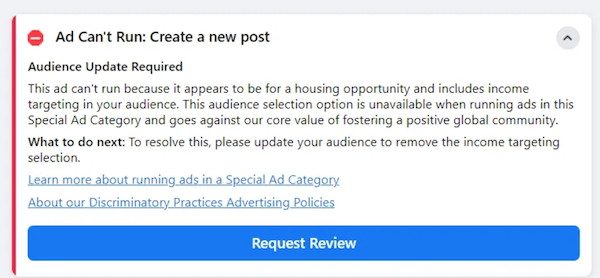
Personal health
This policy restricts advertisers from using “before-and-after” images or images that contain unexpected or unlikely results. Ads also must not attempt to generate negative self-perception in order to promote healthcare, diet, or weight loss products.
Non-functional landing page
This could mean your page is 404ing, has disruptive or malfunctioning popups, or any element that makes it difficult for a user to navigate away from the page.

Nonexistent functionality
Don’t fake it. Your ads or landing pages can’t have elements that look like clickable buttons, checkboxes, and other functionalities that don’t actually work. Often ads that are disapproved for this policy need some small tweaks before they’ll be eligible to run.
Circumventing systems
A policy to prevent circumventing policies! No tactics or tricks, like disguising content, intended to circumvent Facebook’s ad review process.
I have found that this policy is often the cause of incorrect ad disapprovals. If you break this policy and truly haven’t intended to bypass review processes, all you can do is request an appeal!
Using Facebook brand assets
According to Facebook, this is one of the most common reasons for disapproval (in addition to age-restricted material and too much text in the image).
If you mention Facebook or Instagram, there are specific rules:
- You can’t imply endorsement from Facebook, Instagram, or any other entity owned by Facebook.
- You can’t mention them in a way that represents the brand more dominantly than the business or product itself.
- Platform and interface screenshots must be accurate and honest.
- You can’t manipulate logos or trademarked terms or interface appearance.
For more help with this policy, check out the Facebook Brand Resource Center and the Instagram Brand Resource Center.
Prohibited and restricted categories
Of course, there are prohibited and restricted business categories, most of which are common sense. Read on for a general overview, but again, be sure to check the full policy details here for exact terminology and specifics of every rule.
Prohibited categories
Unfortunately, if your business falls into one of the prohibited categories, you won’t be able to use the Facebook Ads platform.
Some of the more obvious categories are body parts, weapons, illegal products or services, tobacco, recreational drugs, malware, or deceitful practices.
Some that you may not be aware of include payday loans, paycheck advances, bail bonds as well as vaccine discouragement, multi-level marketing schemes or get rich quick opportunities.
Restricted categories
These categories are eligible to be advertised but have special requirements and extra restrictions:
Alcohol, branded content, dating services, health and medicine, cryptocurrency, online gambling, politics and social issues, cosmetic procedures, finance and insurance, subscription services.
For many of these, you’ll have to request permission with a specific form and then there will be certain requirements for your ads or landing pages. For example, displaying your terms and conditions, sometimes with a check box, linking to your privacy policy, and making sure important details are clear and prominent.
Here are some of the forms for these categories:
- Online pharmacies, telehealth, and prescriptions must obtain written permission here.
- Addiction centers must use this form.
- Cryptocurrency advertisers can request approval here.
- Online gambling and gaming advertisers require written permission in advance.

What to do for repeated or large volumes of Facebook ad disapprovals
It’s important to stay on top of ad rejections, not only for the obvious reasons, but also because they signal to Facebook whether your account maintains a good standing.
When ads are being rejected in bulk, I recommend reaching out to support when several ads are disapproved at once. The appeal process must happen one single ad at a time and therefore, it can be really difficult to manage for large volumes of ads. Normally, if you open a chat with support, you can share the campaign ID and request that they review all disapproved ads in the campaign.
I’ve unfortunately also had clients that had ads regularly rejected, erroneously. It got to the point that we would automatically reach out to support as soon as new campaigns or ads were activated. I wish there were a better way but unfortunately, that was the best process that I’ve found.
What to do if your Facebook advertising account is disabled
When your Facebook Ads account is disabled, it’s easy to feel a bit helpless. Often there aren’t many reasons given for the disablement. Unfortunately, if you reach out to support, they typically are not allowed to discuss disabled ad accounts or give any details as to why your account has been disabled.
If your account has repeatedly broken the policies above, there’s a good chance that it will not be reinstated, but accounts are often disabled by mistake. In fact, a few years ago, Facebook had a glitch wherein they disabled a large volume of ad accounts over the course of a few days.
Unfortunately, if your account was disabled by mistake, your only recourse is to request a review. You can do this by visiting the Account Quality page within your account. From there, you’ll be able to follow the steps to request a review.
What to do if your Facebook user login is restricted from advertising
Separate from ad account disablements, individual user login accounts can also be restricted from advertising. This isn’t any less stressful than advertising account disablements, unfortunately.
When it comes to support, well, it’s even tougher to get support for individual user logins – likely because individual user logins aren’t directly tied to revenue, in the platform’s eyes.
Likewise with Ad Account restrictions, if a user is seen as having repeatedly broken policies, there’s a good likelihood that that user won’t be reinstated with advertising capabilities.
However, if the account was erroneously restricted, it is likely that it will be reinstated after a review. To request a review, visit the account quality page and request a review.
While losing advertising access isn’t common, it also isn’t *uncommon*, so it is important to be prepared. I bring this up because advertisers should be aware of this. If there are no other users on the account, or especially if there are no other admins, it could mean no one has access (or no one has administrative access) to an ad account that is currently running. Yes, it has happened and no, Facebook support doesn’t work any harder to help you regain access in these instances.
While you shouldn’t be required to have multiple admins on your ad account, it should be considered a best practice in the sense that users are sometimes restricted from advertising erroneously frequently enough for this to be a real issue.
How to get your Facebook ads approved fast [recap]
Again, “fast” is relative. Fast for an ad in a restricted category might mean two days instead of three, while in other categories or circumstances, it could mean less than an hour. Either way, here are the tips and best practices to get your Facebook ad approval as soon as possible:
- Check regularly for disapprovals.
- Read the policy you violated carefully.
- Don’t take risks with ads you want published fast.
- Proofread your ad copy.
- Minimize text in images.
- Keep your tone friendly.
- Target appropriately.
- Check your landing pages for all requirements.
- Make sure your ad is mobile-optimized.
- Try boosting posts if you’re in a prohibited or restricted category.

